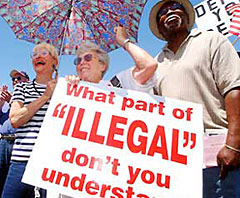 |
 |
 |
 Editorials | April 2005 Editorials | April 2005  
Migration and the War Against Terrorism
 Fred Rosen - The Herald Fred Rosen - The Herald


| | Border Patrol supporters rallied in Temecula last year in response to widespread criticism of sweeps in Ontario and Corona. |
As young Mexicans without prospects in their own country continue to stream across the northern border, it is clear that their desire for work outweighs their concerns about the obvious perils of the trip and their sub-rosa status in the United States. And those perils are on the rise.

The grim nature of the trip has been stated quite concisely by Tom Barry, migration specialist for the Americas Program of the International Relations Center: "Dehydration, hypothermia, and armed gangs that prey on immigrants have left a body count of over 2,000 dead since 1998 when border walls and intensified concentration of the Border Patrol in California and parts of Texas began to force migrants to take more hazardous routes through vast stretches of desolate desert and rugged mountain terrain."

Now, in the "host" country, some members of the U.S. Congress want to raise the level of peril for migrants safely beyond the border. This past December, Rep. James Sensenbrenner, R-Wisconsin, succeeded in attaching his anti-immigrant "Real ID" Act to an Intelligence Reform Bill that was on its way to being passed by the House. Now, anti-immigrant senators, among them Jon Kyl, RArizona, hope to do something similar this month in the Senate.

Kyl's Real ID Act, like Sensenbrenner's, would bar states from issuing driver's licenses to immigrants who cannot prove their official residence. This would expand the responsibility of each state's department of motor vehicles from insuring that licensed drivers know how to drive to enforcing federal immigration policy.

Beyond that, it would make it harder for political refugees to gain asylum by requiring asylum seekers to corroborate, in certain situations with letters from their oppressors, that they were being persecuted for political reasons. And most ominously, it would give the Secretary of Homeland Security authority to waive all laws and due process to complete the building of a wall along the U.S.-Mexico border.

At the heart of these legislative maneuvers is an anti-immigrant sentiment that has dressed itself up as a concern for national security, and made respectable by its immersion in the ongoing U.S. War on Terror.

Some observers, a pair of reporters for the Wall Street Journal, for example, see the controversy over the various versions of a Real ID Act as "a debate that pits groups wanting to bolster border safety against those who are more concerned about safety on the roads." But underlying the debate is the sad fact that the Bush Administration has created a climate in which nearly anything can be justified by letting it be known that it is part of the War on Terror. Even the paramilitary Minutemen, who patrol the U.S. side of the border, hunting illegal immigrants, can claim to be on the front lines of the War on Terror.

Homeland security is covering a lot of ground here. Just as non-existent WMDs were a pretext for the real motives (whatever they were) for the U.S. invasion of Iraq, so the "invasion of terrorists" from Mexico is the cover for the real reasons (whatever they are) for those who want to restrict all immigration, make it harder for all immigrants legal and illegal to remain in the country and literally wall in the country on its southern border.

Anti-immigration sentiment in the United States and movements stemming from those sentiments has been around since immigrants in large numbers began feeding the low-wage labor force as the U.S. economy took off in the mid-19th century. It has been economic ("they are taking our jobs") as well as cultural ("they will change the way we live"). It has always been given a kind of intellectual respectability by certain scholars who have argued that there is an "American character" easily threatened by outsiders (or for that matter, by insiders).

The latest example is Harvard political scientist Samuel P. Huntington who, in his book, The Clash of Civilizations, wrote that "the most immediate and most serious challenge to America's traditional identity comes from the immense and continuing immigration from Latin America, especially Mexico."

But beyond a kind of artificial respectability, the anti-immigration cause now has an artificial urgency stemming from the War on Terror. This, despite the fact that U.S. terrorists have either been homegrown (the Oklahoma City bombers and the abortion clinic bomber) or have entered the country on legal, non-immigrant visas (the 9/11 killers).

It will take meticulous, wellfunded police work to deal with that kind of terror, not a wall along the border or the term "homeland security" attached to every desired executive or legislative action. | 
 | |
 |



